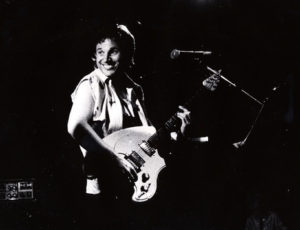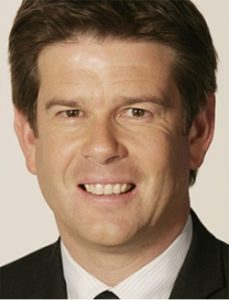1978: Punk
April 12, 2019
By AHNZ
 Punk Rock became of New Zealand in 1978, the year The Enemy became Toy Love°. Lagging behind in the history cycle as always, Punk Rock was already up and running in the USA and then the UK really took to it. Ramones, Joy Division, The Smiths, The Stranglers, The Clash. Sid Vicious of Sex Pistols sang “Anarchy for the U.K.” but he didn’t mean it politically like we do here at Anarchist History- he means it in the Demolition Cycle sense within history.
Punk Rock became of New Zealand in 1978, the year The Enemy became Toy Love°. Lagging behind in the history cycle as always, Punk Rock was already up and running in the USA and then the UK really took to it. Ramones, Joy Division, The Smiths, The Stranglers, The Clash. Sid Vicious of Sex Pistols sang “Anarchy for the U.K.” but he didn’t mean it politically like we do here at Anarchist History- he means it in the Demolition Cycle sense within history.
The U.K. and N.Z. were well due for demolition. In the middle of the Muldoonist Slave Culture time period (1975-80) came the call of dissatisfied youth. They looked at the square, stolid, slavish, stale culture and detested its repression. They looked at their conformist parents and communities with a will to transform and regenerate but, at this point, to smash the old to make room for the new. Music was the vehicle and Punk Rock was seized upon as a revelation releasing that energy just as all Slave Culture phases have been ended every 20 years or so….
“It’s almost impossible to overstate how straight I was as a teenager. I was anxious to please, and polite to the point of absurdity. ..And then punk rock came along…Those arch and beautiful boys who made me understand the potency of disagreement..”– John Campbell
 It’s fashionable today to criticise those who point out flaws without offering solutions. Well, why should they? Demolition work is an essential part of any construction project just as excavating and framing; Why insist these departments be vertically integrated? That story comes later. After Punk killed the dragons and the dinosaurs the path was clear for new energy both in music and all other modes of expression. (Happily, some worthy dinosaurs did not become extinct but revived themselves, eg. Queen did this at Live Aid in 1985. Phew, that was a close one!)
It’s fashionable today to criticise those who point out flaws without offering solutions. Well, why should they? Demolition work is an essential part of any construction project just as excavating and framing; Why insist these departments be vertically integrated? That story comes later. After Punk killed the dragons and the dinosaurs the path was clear for new energy both in music and all other modes of expression. (Happily, some worthy dinosaurs did not become extinct but revived themselves, eg. Queen did this at Live Aid in 1985. Phew, that was a close one!)
“..showed me it was possible to be a different kind of man. A different kind of New Zealand man.”– John Campbell
“The peak of punk passed quickly¹,” wonderful but temporary, lasting only 2-3 years. Easier to tear down than to create, right? “We were raw, tight, abrasive, aggressive and pretty damned proud of ourselves,” wrote² Toy Love frontman Chris Knox. “Punk had the ability to forever change the way you looked at and responded to the world.” John Campbell’s response was to pursue journalism, Peter Cresswell became an architect, Knox’s response was to pitch in and punk rock for New Zealand. The story of Knox’s life is intertwined with that of Punk.
Chris Knox

Prior to this research my file on Knox was pretty small. Adjusted a Velvet Underground song (Venus in Furs, 1967) into a Vogel’s toast advertisement theme (Not Given Lightly, 1987) and that’s about it for my radar. Oh, and It’s a Better Way with Labour (2007) was a good satire tune until you find out it was supposed to be serious and Helen Clark’s ruling party actually commissioned it…!
Chris is an adopted only-child of a middle class Invercargill couple and has always known it. Of uncertain origin, the young epileptic fantasised about his real linage and how he came by that olive complexion. He was grappling with alienation amidst the Stepford Wives and Pleasantville wealthy white people he came to revile. The adopted dad who gave Chris the Knox family name was an accountant and stockbroker. How square, how conservative. As if these were not enough conventionalist credentials, Knox Snr served as the Grand Supreme Ruler of New Zealand Freemasonry.³
“Being Pakeha means..holding our position by laws and orders, by encouraging a freemasonry of white male superiority. It means the ridiculing of other approaches…it means eventual rotting from the inside out.”- Knox; King (1991)
None makes a greater zealot than a convert. All the best country music, rap, or whatever, artists never come from those worlds at all but escape to them and work hard to emphasise the credentials they lack. They become the best at it, whatever it is, because they have their identities to prove. Punk found Knox, and Knox found Punk, as an unqualified, unwashed, hippie who had worked manual labouring jobs with hate for 10 years. Now he had music, he terrified the audiences projecting from the stage his own terror using art rather than choosing to heal…
“The Enemy played at my high school dance in 1979 and got kicked off after two songs. I thought Chris was absolutely terrifying. Years later I found out that he had seen Phil Judd in exactly the same light when he’d attended an early Split Enz performance..”- Shayne Carter; Audio Culture
Knox’s adopted parents helped buy him a house in Grey Lynn, Auckland, which suited him better than Southland. It disrupted the stimulus of his alienation, full of other bourgeois bohemians and multicultural Pacifica and Māori flavour. He made his anti-establishment Punk music and then post-punk pop songs but until about 2007 never left that Punk Demolition attitude behind.
Knox was still infused with Punk, lashing out in print (King (1991)) and in song. In the sarcastic and satirical Song for 1990, the artist rained petulant punk child tantrum lyrics and riffs on the nation’s sesquicentennial anniversary year. This was a punk tirade at Labour 4.0’s expense, a return to form that had become inverted by 2007 when Labour 5.0 paid Knox to join the dark side by creating It’s a Better Way with Labour for them.
Note, selling out to the establishment rather than rebelling against it is not a resolution. It is not healing. It is simply the other side of the same dysfunctional, attachment disorder, coin. It is also the path that leads to “eventual rotting from the inside out” that Knox resisted all his life to that point. Within 2 years, in 2009, Knox suffered a severe stroke that deprived him of much of his speech, concentration, cognitive ability, and motor functions.
Future Punk
 Around about this point in our cultural history cycle (ie 2019) we’re entitled to expect a new Demolition Phase to clear a new path. Rave. Punk. Dadaism. Jazz. But so far all we’ve got is this Honkler thing.
Around about this point in our cultural history cycle (ie 2019) we’re entitled to expect a new Demolition Phase to clear a new path. Rave. Punk. Dadaism. Jazz. But so far all we’ve got is this Honkler thing.
Nobody says it has to be musical but the Victimhood Culture must give way to Slave Culture again as always before. Make no mistake, Punk is Slave Culture. It is passive, not taking responsibility, it is an expression of rage and tantrum and it is coming again. In what form? All we know for sure is that the unprecedented power of this VC phase will promote an equal and opposite reaction in Demolition followed by the long-awaited Honour Culture renaissance. (What form will that take, another war?)
 Somewhere out there in the underground is this generation’s young Chris Knox. And, he’s had it with being told what to do by Outrage Industrial Complex teachers and parents. He’s alienated and sick of his Blue Pilled white mum and ethnic dad, their global warming and anti-plastic ways, their virtue signalling, their imposed gender fluidity, their plastic tikis and designer Māori tattoos. Sick of being dragged along to their protest meetings and vigils, their Feminism, their over-consumption of social media. Tired of conforming and being paraded for Green Party friends, dad’s work mates from his government/academic job, and the token gay friends. It has to happen again, it always happened before. It probably has already begun gathering momentum and certainly cannot be stopped.
Somewhere out there in the underground is this generation’s young Chris Knox. And, he’s had it with being told what to do by Outrage Industrial Complex teachers and parents. He’s alienated and sick of his Blue Pilled white mum and ethnic dad, their global warming and anti-plastic ways, their virtue signalling, their imposed gender fluidity, their plastic tikis and designer Māori tattoos. Sick of being dragged along to their protest meetings and vigils, their Feminism, their over-consumption of social media. Tired of conforming and being paraded for Green Party friends, dad’s work mates from his government/academic job, and the token gay friends. It has to happen again, it always happened before. It probably has already begun gathering momentum and certainly cannot be stopped.
—
° The the band formed in ’77 but became national and re-mastered as Toy Love in ’78
1 “No Future” – punk’s past, Not PC (2009)
2 Pakeha, King (1991)
3 Roger Shepherd: In Love With These Times; Linger.co.nz
ref. Chris Knox: Not giving in lightly; Stuff (2015)
image ref. Knox, Sonoma Message; Audio Culture
image ref. Knox; Murray Cammick Collection, 1982; Audio Culture
ref. Chris Knox: Not giving in lightly; Stuff (2015)
 Like Comment Share
Like Comment Share





